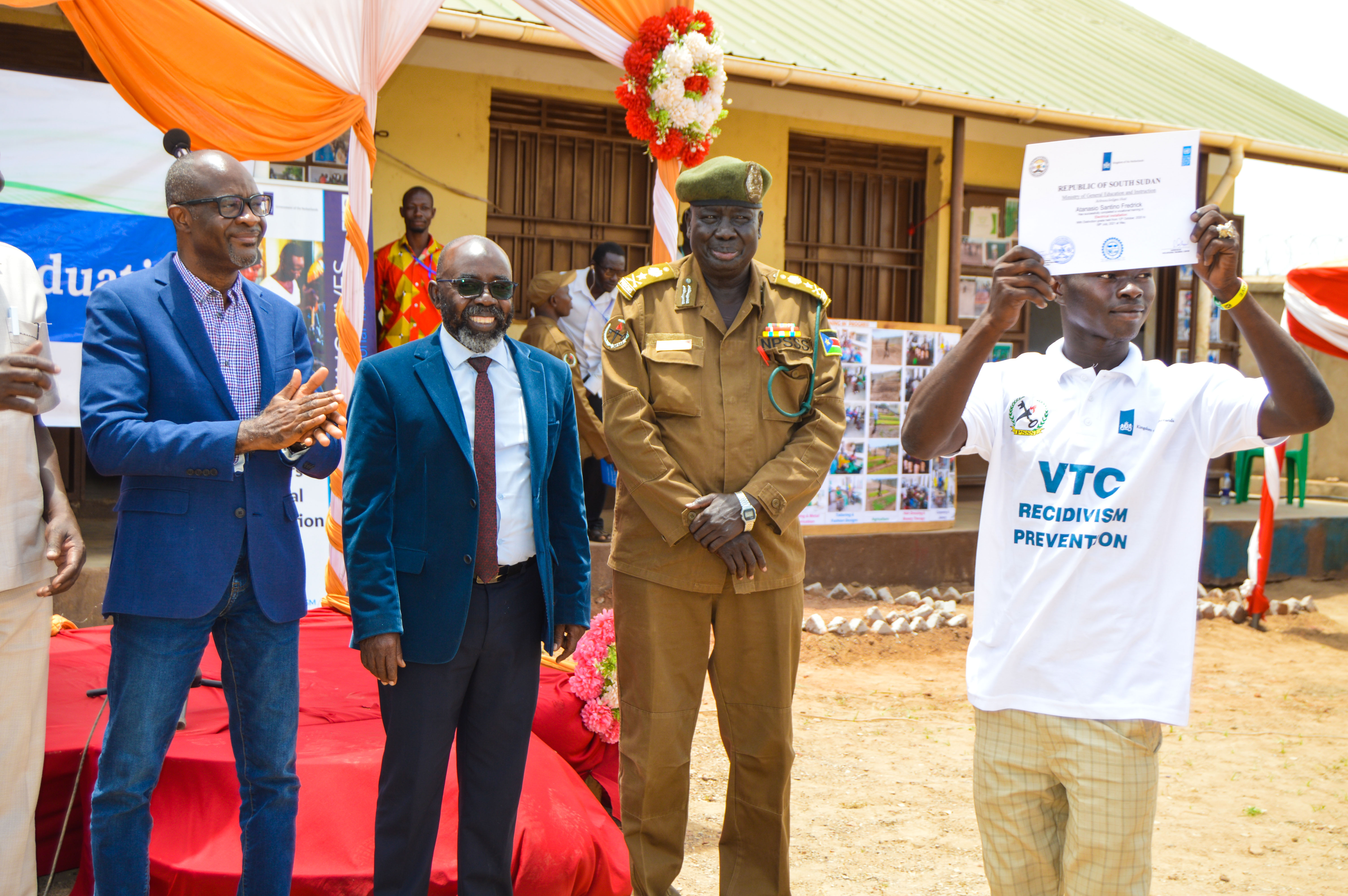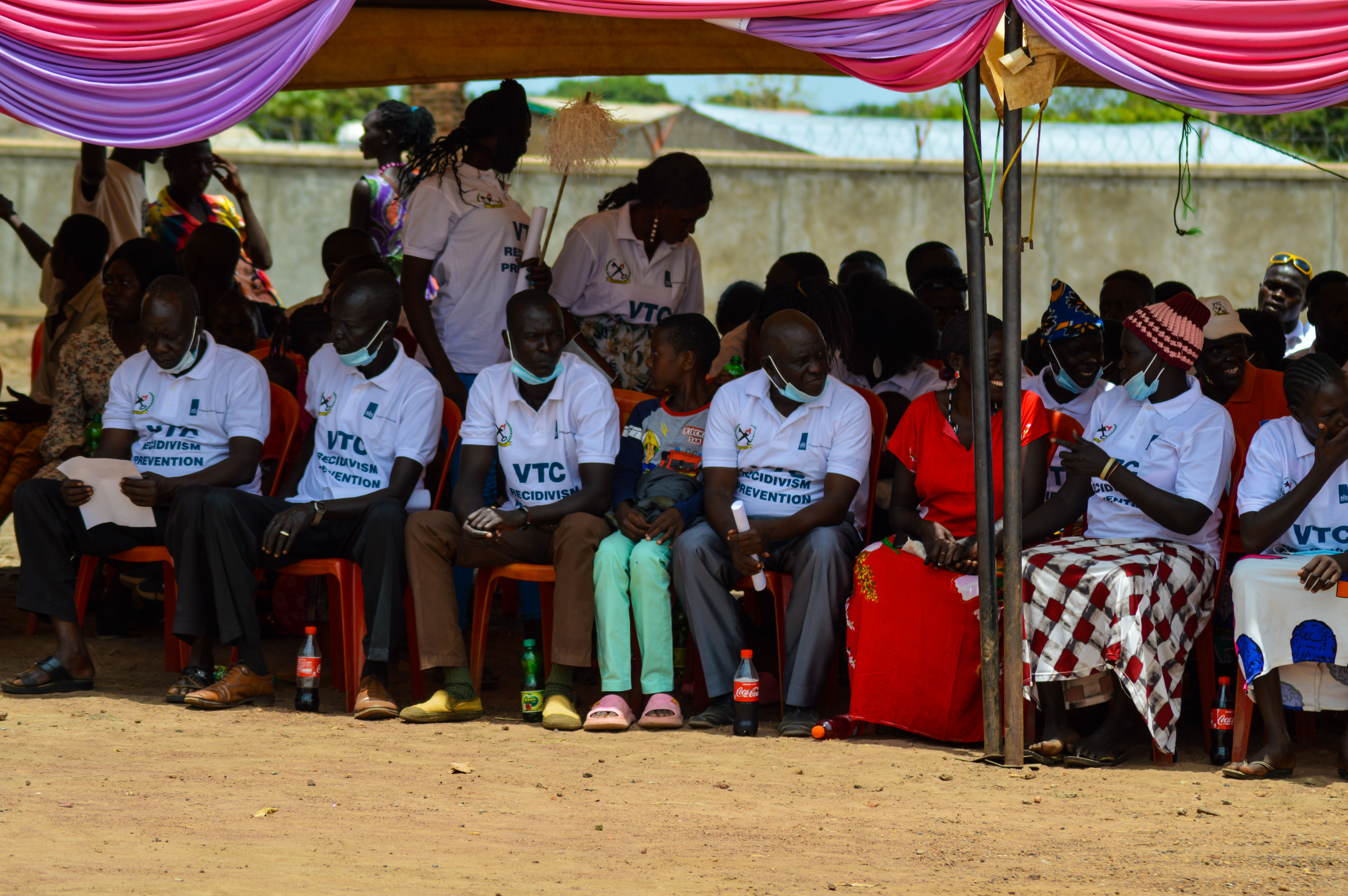Atanasio Santino - a graduate of electrical engineering displays his certificate at the graduation ceremony. Looking onward: UNDP RR- Dr. Sam Doe, Ibrahim Surur- Minister of Local Government - Wau State, Lt. Gen. Longar Wol Director of Training and Human Resources, NPSSS. Photo:UNDP\Amos Agiro
April 28th, 2022, JUBA — A total of 251 inmates have graduated after completing the transformative vocational training designed to rehabilitate prisoners, increase prospects of employment and support re-integration of ex-offenders on release and in so doing reduce recidivism, de-congest prisons and improve community safety.
The sixth batch of 126 inmates from Juba Vocational Training Centre graduated on April 14, 2022, at Juba Central Prison while the second batch of 125 inmates at Wau Vocational Training Centre graduated on April 28, 2022. The graduates completed nine months training in different fields such as food processing, plumbing, electrical and auto mechanic skills, tailoring, hair dressing, carpentry, masonry, metal work, fashion design, agriculture and are given start- up kits after release to enhance their ability to establish and sustain small-scale business ventures.
Cumulatively, 949 adult inmates 137 juveniles and 197 prison officers have graduated from this programme since 2016. Of the graduates, 438 adults and 51 juveniles were released back to the community between 2016 and 2021 with no known reoffending cases amongst them.
Funded by the Kingdom of the Netherlands, this initiative is a collaboration of UNDP, the National Prisons Service of South Sudan (NPSSS) under the Ministry of Interior, the Ministry of General Education, Science and Technology and the Ministry of Labour.
Graduates urged to use skills acquired
Speaking during the graduation at Juba Central Prison, Hon. Mahamoud Solomon Agok the Minister of Interior congratulated the graduates and urged them to use the skills acquired to better themselves, their families and societies.
On his part, Dr. Samuel Doe, the UNDP Resident Representative commended the NPSSS for the robust outreach that monitors former inmates, “We have been informed that 49 of the released inmates who have been traced so far are engaged in different self-employment activities while others have been employed by international organizations, NGOs and the private sector.”
Given its role in reforming inmates, bequeathing them with vital skills and affording them opportunities to engage in fruitful pursuits during and after their jail sentences, Dr. Samuel Doe called for South Sudan to view the vocational training programme as part of the country’s youth empowerment agenda offering a realm of opportunities for young people to have livelihoods, participate in economic activities and the development of their country.
A call to strengthen partnerships
“In this regard, we must seek ways to creatively expand the job market and increase access to capital for released graduates to become entrepreneurs. This will not only cushion them from the economic shock after incarceration but also minimize the anxiety associated with not being able to provide for themselves and their families.”
He also called for strengthened partnership of development partners and the private sector – to join efforts to provide better and more modern training tools and materials at the centers, while also expanding the programme across South Sudan.
Ambassador Jelte Van Wieren of the Kingdom of Netherlands to South Sudan noted that countries which focus on reforming inmates are more secure and have less cases of recidivism than those that dwell on retribution.
Citing an example of a prison in a neighboring country where prison guards, beat an inmate who had gone into an epileptic seizure thinking that he had been possessed, he said that the programmes must not only improve conditions in prisons but must also create awareness, train and improve the working environment of the prison staff such as the guards who look after the inmates.
Lt. Gen. Michael Malau, Director Juba Central Prisons commended the partners for their support, “To our partners, UNDP and the Kingdom of Netherlands, we are so happy because your support is helping us to achieve the mandate of the NPSSS by rehabilitating and reforming inmates at Juba Central Prison.”
Background
With funding from the Kingdom of the Netherlands, the vocational training programme in prisons started in 2016 with the establishment of the Juba Vocational Training Center and has since been expanded to Wau and Malakal central prisons.
Besides skilling inmates, the initiative is a strategic intervention that minimizes recidivism, a challenge to many penal institutions across the world contributing to overcrowding in detention places by at least 37%. Presently, a total of 349 inmates and 38 prison officers are undergoing training in Juba, Wau and Malakal Vocational Training Centers and are scheduled to complete in July 2022.
###
For more information contact:
Michael Mubangizi, Communications and Innovations Analyst: michael.mubangizi@undp.org, +211921004139
Graduates seated with their friends and families at the graduation ceremony. Photo: UNDP\Amos Agiro

 Locations
Locations
